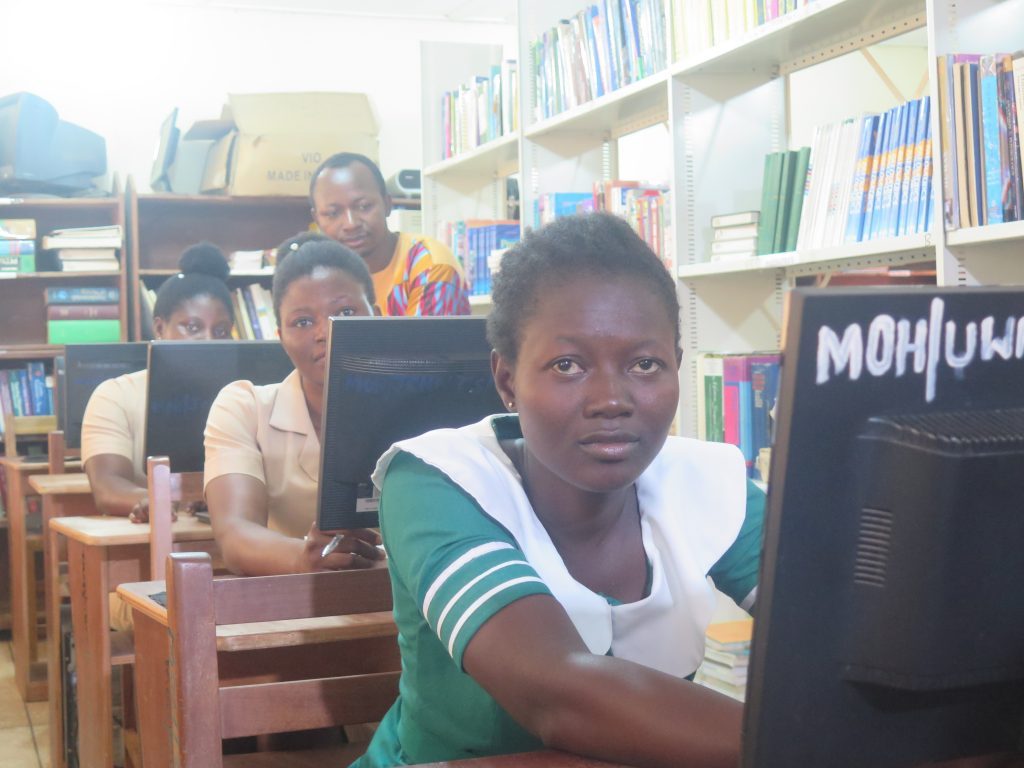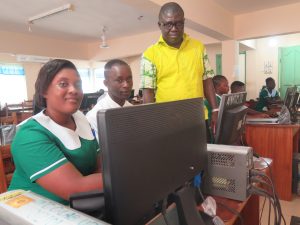In what amounts to a virtual group-hug-gone-viral across Ghana, administrators, teachers and students of nursing and midwifery are eagerly embracing eLearning.
With the Ghana Ministry of Health eLearning Secretariat, the U. S. Agency for International Development’s flagship Maternal and Child Survival Program (MCSP) has been deploying an eLearning platform called Moodle to midwifery and nursing schools across the country. Jhpiego leads the MCSP consortium of partners.

Teachers and students are enthusiastic about using Moodle on computers and mobile devices because it gives them ready access, anywhere and any time, to course materials, tutor notes and even new information to supplements what’s covered in class.
Educators at health training institutions attest that it enhances existing learning environments because it allows for the creation of online courses that focus on interaction and collaborative construction of content. Another big plus: it’s conducive to an ongoing evolution of academic content, ensuring that course materials stay current.
David Kankuubata, the Information Communication Technology tutor at the Nandom Midwifery Training School, describes eLearning as a great equalizer. “It gives trainees from all sorts of socioeconomic backgrounds access to the same course content,” he says, adding that it bridges academic gaps between schools in urban and rural areas in Ghana.
In Ghana, it doesn’t get much more rural than in the Upper West region where, in October 2017, the eLearning infrastructure was installed at the Jirapa Community Nursing Training School. Adiza Amadu, a nursing student there, especially likes that she and her peers no longer need to copy lecture notes while the teacher explains lessons—because they are already available online. “We can read the notes (and be prepared) before the teacher comes to discuss it with us,” she says.
Although initially anxious about taking quizzes on computers, she was immediately impressed by the benefit of seeing results instantly after clicking the submit button. “Usually it will take weeks before we get our marked quizzes from our teachers,” she said, “and sometimes we don’t even get them.”
eLearning offers unparalleled advantages not only to students in need of flexible study hours and unlimited materials outside of classrooms, but also teachers overwhelmed by huge class sizes, and administrators aiming to turn out the very best practitioners of nursing and midwifery.
“Those of us who went to nursing training school in Ghana have memories of over 100 pupils in a classroom and one teacher, perhaps,” recalls Charles Agyeman Prempeh, vice principal of the Agogo Nursing and Midwifery Training College. “We have 21 tutors (at Agogo) handing over 750 trainees, so eLearning is the only way we can increase contact hours without getting extra tutors.”

His college has made significant investments in technology, including the installation of interactive boards for presentations with video and audio capabilities in all classrooms, and the planned refurbishment of the ICT laboratory with new computers. The college also boasts a well-stocked library and skills laboratory for hands-on learning. Even so, Prempeh realizes that his institution had barely scratched the surface in terms of what digital learning has to offer. The Moodle initiative has, he says, really set Agogo’s eLearning experiment into high gear.
“I like that video and audio content can be shared,” he says, “because our training is skills-based, and this allows for demonstration.”
MCSP has deployed both the Moodle eLearning platform and “Hello Nurse,” a mobile interactive story app, to 27 nursing and midwifery schools throughout Ghana with a plan to deploy Moodle in four more schools by March 2019.
Emmanuel Attramah is a Knowledge and Communications Officer for Jhpiego/MCSP Ghana.



